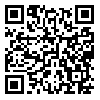Volume 27, Issue 6 (10-2019)
JSSU 2019, 27(6): 1612-1627 |
Back to browse issues page
Abstract: (3285 Views)
Introduction: The purpose of the present study was to investigate the relationship between personality traits and psychological well-being in people with irritable bowel syndrome with mediating role of emotional regulation.
Methods: Research method according to the applied purpose, and the data collection method was a descriptive correlation and a quantitative data type. The statistical population of this study was all the patients with irritable bowel syndrome referring to Danesh Gastrointestinal Clinic in Tehran in 1396. The sample size was 390 participants selected by calculate sample size in structural equations and using a sample purposive sampling method. In order to measure the variables, personality traits Neo Costa & McGary (1992), Psychological well-being Ryff (1989), and of emotional regulation Gross and John (2003) questionnaires were used. Evaluation of the proposed model was done using structural equation modeling and SPSS Inc., Chicago, IL; Version 18 as well as Amos. The reliability, convergent validity and divergent validity of the questionnaire, were investigated. Moreover, path coefficients and software significance coefficients were used to examine the research hypotheses.
Results: The results showed that the degree of appropriateness of the proposed model was appropriate to the components of the research; personality traits and psychological well-being were found to be correlated with the role of mediator of emotional regulation in the patients with irritable bowel syndrome (p <0.0001).
Conclusion: This research confirms the relationship between personality traits and psychological well-being with the mediating role of emotional regulation in people with irritable bowel syndrome. Because of Numerous scientific evidence in the ontology of this syndrome, further study on emotional skills and related problems in people with irritable bowel syndrome are required.
Methods: Research method according to the applied purpose, and the data collection method was a descriptive correlation and a quantitative data type. The statistical population of this study was all the patients with irritable bowel syndrome referring to Danesh Gastrointestinal Clinic in Tehran in 1396. The sample size was 390 participants selected by calculate sample size in structural equations and using a sample purposive sampling method. In order to measure the variables, personality traits Neo Costa & McGary (1992), Psychological well-being Ryff (1989), and of emotional regulation Gross and John (2003) questionnaires were used. Evaluation of the proposed model was done using structural equation modeling and SPSS Inc., Chicago, IL; Version 18 as well as Amos. The reliability, convergent validity and divergent validity of the questionnaire, were investigated. Moreover, path coefficients and software significance coefficients were used to examine the research hypotheses.
Results: The results showed that the degree of appropriateness of the proposed model was appropriate to the components of the research; personality traits and psychological well-being were found to be correlated with the role of mediator of emotional regulation in the patients with irritable bowel syndrome (p <0.0001).
Conclusion: This research confirms the relationship between personality traits and psychological well-being with the mediating role of emotional regulation in people with irritable bowel syndrome. Because of Numerous scientific evidence in the ontology of this syndrome, further study on emotional skills and related problems in people with irritable bowel syndrome are required.
Keywords: Personality traits, Psychological Well-Being, Emotional Regulation, Emotional Control, Irritable Bowel Syndrome
Type of Study: Original article |
Subject:
Psychology
Received: 2018/12/9 | Accepted: 2019/02/23 | Published: 2019/10/20
Received: 2018/12/9 | Accepted: 2019/02/23 | Published: 2019/10/20
| Rights and permissions | |
 |
This work is licensed under a Creative Commons Attribution-NonCommercial 4.0 International License. |




